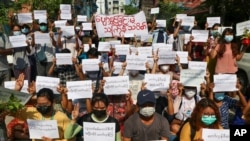Anti-coup demonstrators across Myanmar turned the country’s traditional New Year’s celebration into a quiet protest against the military junta Tuesday, as the United Nations warned the situation could deteriorate into “full-blown conflict.”
The February 1 coup that removed de facto leader Aung San Suu Kyi and her civilian government from power has prompted people in Myanmar to forgo the usual rituals of the five-day Thingyan festival, including raucous water fights in the streets. Protesters instead painted pro-democracy symbols and slogans on the traditional flower pots displayed during Thingyan, including the three-fingered salute that has come to symbolize Myanmar’s resistance movement.
The coup has sparked daily mass demonstrations across Myanmar demanding the return of Suu Kyi and her elected government to power.
The junta has responded with an increasingly violent and deadly crackdown against the protesters. The Assistance Association for Political Prisoners, a nongovernmental monitoring organization, estimates that more than 700 people have been killed since the coup, including more than 80 protesters killed Friday in the southern city of Bago, located more than 70 kilometers northeast of the country’s largest city, Yangon.
The violence prompted U.N. human rights commissioner Michelle Bachelet to issue a statement Monday warning that the situation in Myanmar is “heading towards a full-blown conflict” similar to the current bloody civil war in Syria.
“Statements of condemnation, and limited targeted sanctions, are clearly not enough,” Bachelet continued. “States with influence need to urgently apply concerted pressure on the military in Myanmar to halt the commission of grave human rights violations and possible crimes against humanity against the people.”
Suu Kyi has been detained since the coup, and is facing six criminal charges, the most serious of them a charge of breaking the country’s colonial-era secrets law that could put her in prison for 14 years if convicted.
The military cited widespread fraud in last November’s general election -- which Suu Kyi’s National League for Democracy won in a landslide -- as its reasons for overthrowing Suu Kyi’s government.





